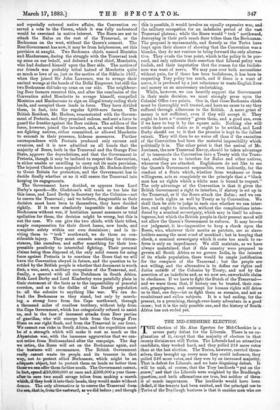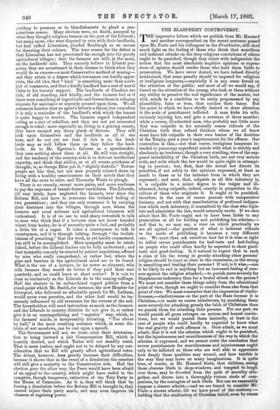THE MID-CHESHIRE ELECTION.
THE election of Mr. Alan Egerton for Mid-Cheshire is a severe party defeat for the Liberals. There is no ex- planation of it, except that the majority of electors in that county divisionare still Tories. The Liberals had an attractive candidate, they worked hard, and they polled 218 more votes than at the last election. The Tories, however, exerted them- selves, they brought up every man they could influence, they polled 346 more votes, and they won by an increased majority. That is defeat for Liberals, and we hate disguising defeat. It will be said, of course, that the Tory landlords "put on the screw," and that the Liberals were weighted by the Bradlaugh question, and both affirmations are true, but neither of them is of much importance. The landlords would have been defied, if the tenants had been excited, and the principal use to Tories of the Bradlaugh business is that it enables men who are
yielding to pressure or to blandishments to plead a con- scientious reason. Many electors were, no doubt, annoyed by what they thought religious treason on the part of the Liberals ; but many more, who were disposed to vote with their landlords, but had talked Liberalism, pleaded Bradlaugh as an excuse for deserting their colours. The true reason for the defeat is that Liberalism has not penetrated far enough into the purely agricultural villages ; that the farmers are still, in the main, on the landlords' side. They scarcely believe in Liberal pro- mises, they are accustomed in their dreams to think what they would do as owners—a most Conservative method of musing— and they retain to a degree which townsmen can hardly appre- ciate, the old idea that " land" is something more than a sub- ject of commerce, and that a kindly landlord has a sort of moral claim to his tenants' support. The landlords of Cheshire are rich, of old standing, and kindly, and the farmers feel as if there were something of ingratitude and frowardness in refusing requests for assistance so urgently pressed upon them. We all assume in London that an agent's letteris a threat, but very often it is only a reminder of the landlord's wish which the tenant is quite happy to receive. The farmers regard independent voting as a sort of rebellion, and they are not yet interested enough to rebel ; more especially as, living in a grazing county, they have escaped any sharp pinch of distress. They still look upon themselves and the landlords as all in one boat, and do not yet see that if this is so, the land- lords may as well follow them as they follow the land- lords. As to Mr. Egerton's failures as a speechmaker, they care nothing about them at all. He will vote straight, and the tendency of the country-side is to distrust intellectual capacity, and think that ability, or at all events quickness of thought, is, as George Eliot put it, "slightly diabolic." Towns- people are like that, but not men properly sobered down by living with a healthy consciousness on their minds that they have all the cows to calve, and Thornaby Waste to plough.
There is no remedy, except more pains, and more readiness to pay the expenses of tenant-farmer candidates. The Liberals, till very lately, have neglected the farmers, ever since the Reform Bill, and have to overcome the irritated feeling of two generations ; and they can only overcome it by carrying their doctrines into the villages, through men whom the farmers and rural artisans and agricultural labourers will understand. It is of no use to send sharp townsfolk to talk to men who think that if a lecturer does not know bearded wheat from barley, he is of necessity quite a fool, and probably a little bit of a rogue. It takes a countryman to talk to countrymen, and it is through talking, through "the foolish- ishness of preaching," that the work, as yet hardly commenced, has still to be accomplished. More sympathy must be estab- lished, before the Liberal leaders can be fully understood ; and that sympathy can only be created by patient expositions, offered by men who really comprehend, or rather feel, where the gaps and barriers in the agricultural mind are to be found.
What is the use of a lecturer, be he never so eloquent, who tells farmers they would do better if they paid their rent quarterly, and so could leave at short notice? It is vain to trust so exclusively as the Liberals do to the coming suffrage.
Half the electors to be enfranchised regard politics from a stand-point which Mr. Smith, for instance, the new Member for Liverpool, who delivered an admirable speech for Mr. Latham, would never even perceive, and the other half would be im- mensely influenced by old reverence for the owners of the soil.
The householders will need instruction as much as the farmers, and the Liberals in country districts do not give it, or rather give it in an unsympathising and " superior " way, which, to the farmers' minds, is inexpressibly irritating. "Too clever by half," is the most crushing sentence which, in some dis- tricts of wet meadows, can be cast upon a speech.
The Government will not, we trust, relax their determina- tion to bring forward a fair Compensation Bill, which is heartily desired, and which Tories will not steadily resist.
That is mere justice, and ought not to be delayed by any con- sideration that no Bill will greatly affect agricultural votes.
The defeat, however, does greatly increase their difficulties, because it shows that in the event of a dissolution the counties will still give a majority to the Conservative side. Had the election gone the other way, the Peers would have been afraid of an appeal to the country, which might have ended in the complete, though temporary, extinction of the Tory Party in the House of Commons. As it is, they will think that by forcing a dissolution before the Reform Bill is brought in, they cannot injure their party much, and may even improve its chances of regaining power.



































 Previous page
Previous page